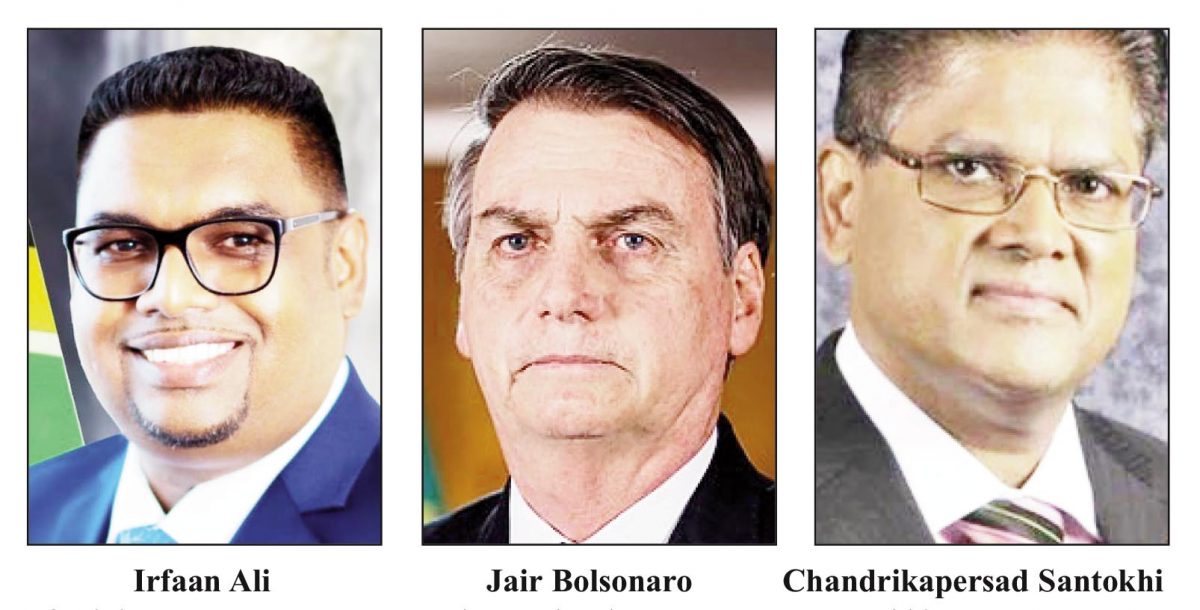In a plan he signalled since last August, President Irfaan Ali will today be inking a Memorandum of Understanding with Suriname and Brazil to develop a regional energy corridor using natural gas reserves, an official of the Guyana Government yesterday said.
“It is no secret that the Government of Guyana had plans to develop a regional energy corridor in a tripartite agreement with Suriname and Brazil… the Arco Norte project will especially meet the energy needs of the three countries,” a top government official told the Stabroek News, while confirming that the three leaders will today sign a formal agreement.
President Ali is scheduled to leave Georgetown for Paramaribo this morning to meet with the President of the Republic of Suriname, Chandrikapersad Santokhi, and the President of the Federative Republic of Brazil, Jair Bolsonaro, on a “working” visit, his office disclosed yesterday.
“The leaders are expected to discuss the formation of an energy corridor, oil and gas and other natural resources opportunities, among areas of common interest,” the Office of the President report stated.
On Friday, according to the report, President Bolsonaro and a team of officials are expected to travel to Georgetown for a one-day official visit with President Ali and his team of Ministers.
“Discussions will centre on improving economic relations, energy and food security, telecommunications, agriculture, infrastructure integration and the development of a deep water harbour in Guyana. Since Guyana offers the shortest and quickest access to the Atlantic for significant parts of northern Brazil, a road connection linked to the deep-water port could also serve the interest of both countries.
The Office of the Pre-sident noted that when the two leaders spoke last Monday via teleconference, they “discussed enhancing the Partial Scope Agreement between their nations with the hope of bolstering trade,” and, “also deliberated on topics for further engagements at the Ministerial levels.”
Shortly after taking office in 2020, Ali had signalled that Guyana and Suriname, given their oil and gas development status, will fuse synergies to make their countries energy efficient.
Then last year during a visit by the Surinamese president, the two sides made among other commitments, an agreement to pursue proposals to craft a joint strategy to develop natural gas reserves which also potentially aims at tapping into the lucrative Brazil market.
“In the area of oil and gas and recognizing that both countries will be key players in the oil and gas sector, we have decided that we’re going to collaborate and develop a ‘Joint Approach Strategy’, not only in the development of the industry itself, but in supporting the development of our human resources to meet the industry requirement,” President Ali had announced alongside President Santokhi.
Both presidents had explained that they had also decided on an initiative where they will invite the presidents of Brazil, and French Guiana’s governor, France, to be part of an energy summit to discuss the Arco Norte gas pipeline and electricity generation project.
This project envisages the interconnection of the Guyana, Northern Brazil, Suriname, and French Guiana power systems.
The Arco Norte region consists of Guyana, Suriname, Brazil (the northern states of Amapá and Roraima) and French Guiana. According to the Inter-American Development Bank (IDB), a study on the project states that, “The electrical interconnection of the Arco Norte region would improve the regional electricity system, allowing electricity trading among these countries. This would allow for an optimal power generation expansion plan, under which the region could use the most efficient sources of electricity, minimizing costs and environmental and social impacts. Regional electricity trading would also help guarantee security of supply.”
It is unclear if any official from French Guiana will be part of today’s gathering in Paramaribo.
“More specifically, recognising the potential of gas in Guyana and Suriname, we have decided that the working group will be established to come up with a joint gas strategy for both countries. But that strategy would be linked to the frontier development of both Guyana and Suriname. That includes infrastructure, industries, manufacturing, [and] natural resources; the bauxite industry on both sides will be part of that strategic outlook in developing opportunities and exploiting the great potential on both sides of the Corentyne River,” Ali had declared.
“So, in essence, through the gas strategy, the ‘Joint Gas Strategy’; we will be working on a ‘Joint Development Strategy’ for the frontier that will support the development of both economies. As we have said, we are not in competition, but we are on a journey of cooperating with each other to maximize the benefits for our people. And in order to ensure that we do it successfully, we will have synergies in terms of infrastructure, and the use of infrastructure,” he added.






